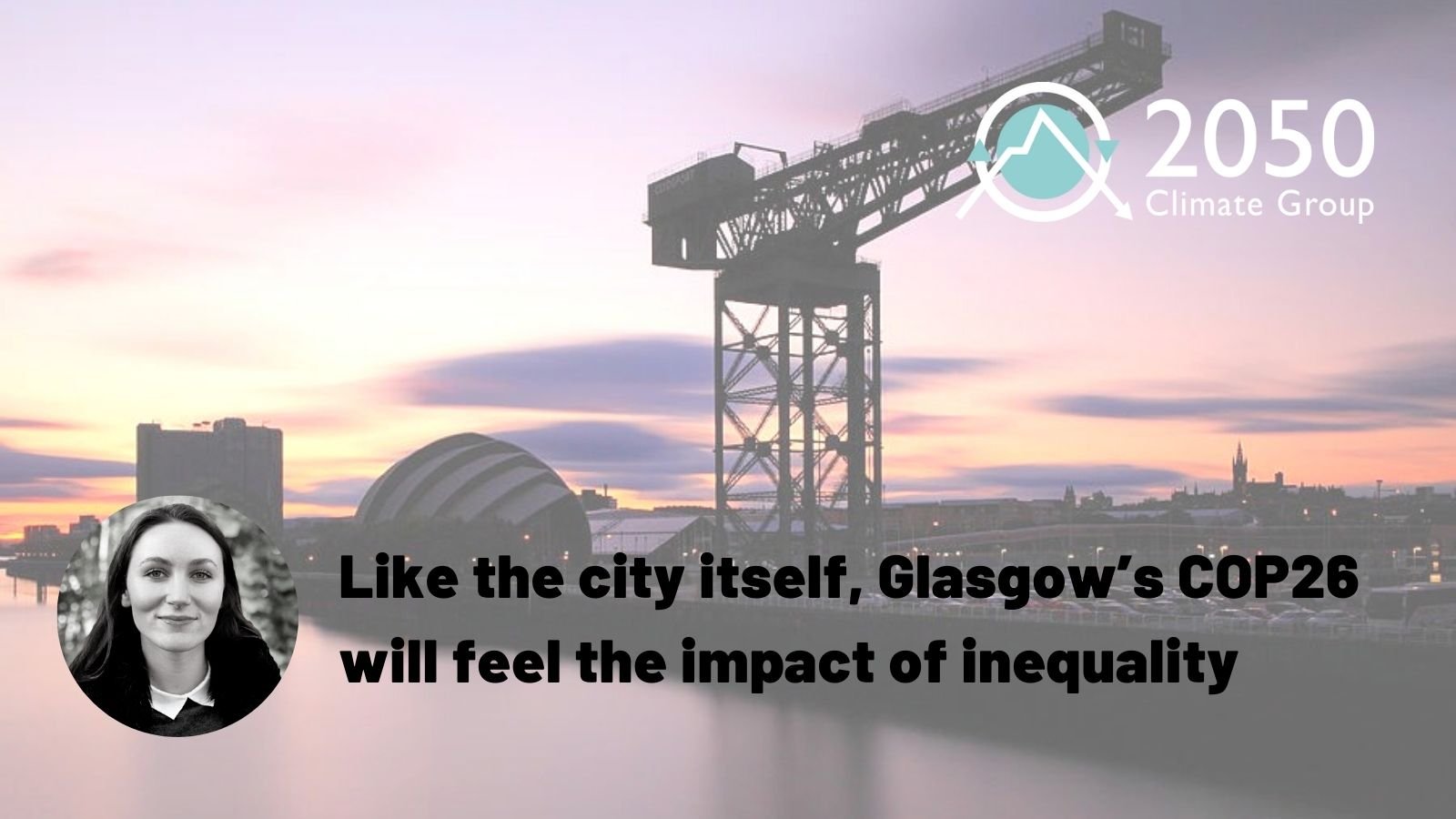Like the city itself, Glasgow’s COP26 will feel the impact of inequality
You may have noticed that there’s a big climate conference coming to Glasgow. From 31st October, Glasgow will host COP26, which is being heralded as the ‘last best chance’ for meaningful, binding climate agreements to keep global carbon emissions below 1.5C.
I grew up in Clydebank, a town a few miles West of Glasgow with a proud industrial past and strong ties to the River Clyde. It is along the banks of the River Clyde where global leaders, government ministers, activists, scientists, faith groups and many others from around the world will meet. With ambition and determination, this site could potentially be the place of an historic climate agreement.
My home city has many faces. From the Gaelic, Glasgow translates as Dear Green Place and is known for the wealth of beautiful public parks throughout the city. It is a city of culture: art, music, fashion, and literature make the very being of the place hum with creative energy. There is a proud labour history too: from the Red Clydeside to present day union strikes taking place during the COP26 discussions.
Glasgow is a complex place, where a disproportionate number of people know hardship and inequality all too well. A phenomenon referred to as “the Glasgow effect” sees the city struggle with complicated socio-economic and health problems. It has always been a place of wealth inequality: Glasgow was known as ‘the second City of the British Empire’, due to the crucial role the city’s shipbuilding, textiles and tobacco trade played in the UK’s colonial empire building. The legacy of Glasgow’s connection to the slave trade is written into its street names.
Despite dealing with “wicked problems” and too much weather, the city is probably proudest of its reputation as welcoming. In November 2021, the friendliest city will open its arms to the world.
This will be the first time I have attended COP, and it will be in my own Dear Green Place. Through my role as a Trustee with 2050 Climate Group and with support from my employer, I have the privilege of being a delegate within COP’s Blue Zone with very little financial implication to me personally. But this has not been the experience for so many others. It appears that the curse of inequality, which is so synonymous with the city, will blight Glasgow’s COP.
The UK Government will host COP26 and despite initially claiming that ‘all voices [will be] heard throughout the COP26 process’, it looks set to be the ‘most exclusionary COP ever’. The Covid19 pandemic has been a significant barrier to access, especially as many countries around the world struggle to access vaccine supplies for their population. It is estimated that ‘rich countries have received 16 times more Covid-19 vaccines per person than poorer nations that rely on the Covax programme backed by the World Health Organization’. For this reason, many climate NGOs, charities, and activists – including Greta Thunberg – called for COP26 to be rescheduled to ensure equitable access for delegates from lower income countries.
The world’s wealthiest nations have not done enough to speed up distribution of the Covid19 vaccine to lower income countries. This failure does not bode well, as COP26 will present the more complex issue of achieving consensus on how each country can limit their domestic emissions to keep warming below 1.5C. If rich countries haven’t done enough in the pandemic, will they step up to their responsibility around historical emissions, loss and damage, and climate financing?
In addition to accessing Covid19 vaccinations, there has been complications with the UK’s visa process for delegates trying to get to Glasgow. The impacts of climate breakdown are felt most acutely in the Global South and yet, it is more difficult and more expensive for those from the most affected areas to access COP.
Even if you do make it to Glasgow, the limited accommodation (30,000 attendees, only 15,000 hotel rooms) coupled with free market capitalism has led to extortionate rates for a room at COP26. They say that #PeopleMakeGlasgow but many Glasgow residents have not felt part of the COP preparations. For some, the only relevance it seems to have to everyday life is inconvenience or maybe a chance to make some money?
We already see the impacts of climate breakdown around the world. In many cases, nations being hit hardest by the warming climate will have the smallest delegations attending COP26. For example, ‘one third of Pacific small island states and territories do not plan to send any government figures to the COP26 summit in Glasgow due to Covid-19 travel restrictions’. Low-lying nations do not have the luxury of time. Their communities, ecosystems and cultures are at severe risk of rising sea levels. Any delay on climate action will be catastrophic for these islands. Marshall Islands President David Kabua explained: “The difference between 1.5 degrees and 2 degrees is a death sentence for the Maldives”.
I have spent my 20s talking about climate change. Sometimes I am given the opportunity to speak to large audiences and at times, I am introduced as ‘speaking on behalf of young people’. So often, we hear that organisations and charities can ‘provide a voice’ to other people who are without agency. But the reality is that I cannot speak on behalf of anyone else. I can try, with the limited resources and power that I have, to amplify others. I can try to learn and be an ally. Yet it is not my place – or that of any other delegate – to speak for others. People around the world are witnessing, grieving, and living the devastating impact of climate breakdown. They are the only ones who can give voice to that reality. Global inequalities have kept many of these critical voices shut out.
As climate activist Vanessa Nakate says, "While we may all be in the same storm, we are not all in the same boat". For those who should be at COP26, but will not be able to make it, they will be left outside in the storm, holding their breath. The world watches as decisions are made by those privileged enough to be in the boat on the banks of the Clyde. Without inclusion and global ambition, COP26 could sink any chance of averting climate catastrophe.

